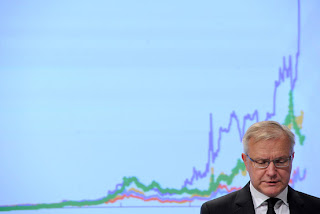Friday, 16 September 2011
Finance Chiefs Meet to Resolve Splits on Crisis
Euro-area finance ministers begin meeting here Friday to seek agreement on several crisis-fighting measures left unresolved despite weeks of talks, amid worries that governments lack the political will to prevent financial catastrophe from striking the southern euro zone.
This is the first meeting of finance ministers since a July 21 accord by heads of government to expand the 17-member bloc's bailout fund, the European Financial Stability Facility, and extend a second round of lending to Greece.
Prolonged efforts by euro-zone countries to solve the sovereign-debt crisis have led to a weaker economic outlook for Europe, European Commissioner for Economic and Monetary Affairs Olli Rehn said Friday.
"The biggest problem is that the ratification of the July decisions has taken too long, and that has caused insecurity and led to a weakened economic outlook for the whole of Europe," Mr. Rehn told Finnish public broadcaster YLE. "This is aggravating the situation of troubled countries."
Implementation of the deal has been held up by sparring national interests, most notably a demand by Finland for Greek collateral that has led other member states to ask for the same.
The euro zone's failure to quell the debt crisis has sparked frustration from the International Monetary Fund and the U.S. and volatility in financial markets.
U.S. Treasury Secretary Timothy Geithner will be in Wroclaw on Friday for meetings of ministers from the euro zone and all 27 EU nations. He is expected to plead with the Europeans to take more decisive action to prevent Greece's debt problems from infecting banks across Europe and possibly spreading to the global financial system.
Europe's banks are increasingly relying on the European Central Bank for funding, finding it difficult to borrow dollars as U.S. institutions pull back capital in response to the region's escalating debt crisis.
Mario Draghi, the next president of the ECB, also pleaded for haste to restore confidence in financial markets and the economy. "Delay or uncertainty in this process could contribute to further market turbulence," Mr. Draghi said in a contribution to Germany's Handelsblatt newspaper published Friday. "It's more important than ever, that governments demonstrate unity and speak with one voice."
Finance officials are also expected to discuss the possibility of creating "euro bond" debt issued collectively by the euro zone that can be used as funding for weaker members of the currency bloc. The commission will study the idea in the coming weeks, but officials say it will be a while before it is formally proposed, if at all.
The tightening liquidity comes as fears have spiked that Greece could default and be kicked out of the euro zone, which EU leaders have said would have political and economic consequences for the entire European Union.
Markets took some comfort from a statement by German Chancellor Angela Merkel, French President Nicolas Sarkozy and Greek Prime Minister George Papandreou, who said after a three-way call Wednesday night that "the future of Greece is in the euro zone."
That appeared to raise hopes the governments would agree to disburse the next tranche of aid due to Greece, despite new data showing the country isn't on track to meet budget targets agreed with the EU and the International Monetary Fund. Failure to get that agreement also would threaten the implementation of a second €109 billion rescue package to provide for Greece's financing needs over the next few years.
Talks on Finland's collateral demands have focused in recent weeks on a plan to provide noncash Greek government assets to countries willing to pay for it; officials are discussing whether that should happen through cash sent to the EFSF or reduced payments of the EFSF's profits.
The plan isn't likely to be ready for sign-off at this week's informal gathering in Poland, euro-zone officials said. Officials are still trying to ensure that "negative pledge" clauses in some Greek bond contracts—which prevent any creditors from getting favorable treatment—wouldn't be triggered by Greece's handing over collateral to some euro-zone governments, one official said.
The July 21 agreement calls for the EFSF to get new powers, including the ability to buy sovereign debt in the secondary market and lend money to governments to recapitalize their banks. The deal is also contingent on Greece's private-sector creditors agreeing to exchange their bonds maturing before 2020 for longer-dated bonds, providing €135 billion in additional financing to the country.
Those elements have proved to be stumbling blocks.
Negotiations between the financial institutions that own Greek debt and the government may not yield the targeted amount, officials warn. Meanwhile, opposition to the agreement in national parliaments is rising:
Members of Germany's national parliament have threatened to oppose changes to the EFSF, and Slovak Parliament Speaker Richard Sulik said he would fight to delay a vote on expanding the EFSF, at least until the end of the year.
Austria's parliament on Wednesday rejected a government attempt to fast-track the vote, which now isn't expected before October.
Austrian Finance Minister Maria Fekter said here on Friday that alternatives to current rescue measures for Greece could be considered if those efforts turn out to prove too expensive. She also insisted that collateral for future Greek aid should be available to all euro-zone donor countries.
The U.S. and China are asking for quick and decisive action in Europe. In interviews last week, Mr. Geithner said he would like to see more political will from European leaders to end the sovereign-debt crisis. Mr. Geithner said it was "absolutely" in the U.S.'s interest that the euro survive as a currency.
Meanwhile, Chinese Premier Wen Jiabao voiced support for Europe Wednesday, but offered no new specific help for the debt-battered continent.
read more: Olympus Wealth Management
Subscribe to:
Post Comments (Atom)


No comments:
Post a Comment